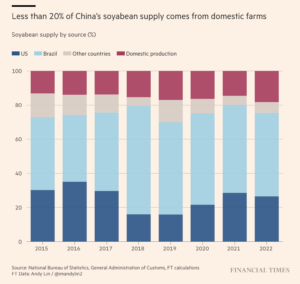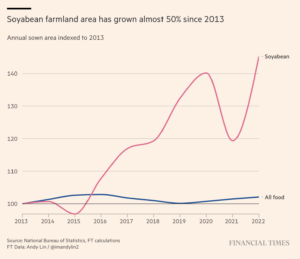Defining The Disruptive Geopolitics Of The Global Farms Race
August 14th, 2023
Courtesy of The Financial Times, a report on China’s efforts to expand farmland in a bid to reduce its reliance on foreign food:
In the western Chinese city of Chengdu, once popular hotpot restaurant Star Shining in the Clouds has closed its doors for the last time, one of several businesses to shut as the government tries to increase the amount of land under cultivation.
Local authorities have taken over 6,700 hectares in Chengdu alone, closing multiple companies, as part of a bigger nationwide push to plant corn and soyabean to boost food security.
The plan, which has yet to lead to significantly higher output, has devastated businesses such as Star Shining in the Clouds, open for just two years before it was closed in April this year. “We wouldn’t have opened the restaurant had we known it would be torn down so quickly,” said a former employee.
Across the country, authorities have reclaimed more than 170,000 hectares since 2021 as Beijing tries to reduce its reliance on imported food amid fears confrontation between China and the US could disrupt global supply chains.
In a speech last year, China’s president Xi Jinping said authorities must take “hard measures that grow teeth” to maintain 120mn hectares of cultivated land across the country — the level widely seen by Beijing as necessary to secure self-sufficiency.
“China must be able to feed its people on our own,” said Xi. “We will fall under others’ control if we can’t hold our rice bowl steady.”
Increased urbanisation and a manufacturing boom in China have contributed to a greater reliance on food imports over the past decades. About three-quarters of the soyabeans China consumes come from the US and Brazil, official data shows. China also imported 7 per cent of its corn last year, up from less than 1 per cent a decade ago.
Given rising geopolitical tensions, “China is preparing for the worst-case scenario in which it couldn’t buy any food from abroad”, said Yu Xiaohua, an agricultural economics professor at the University of Göttingen. “The authority is counting on the reclamation drive to improve the country’s grain self-sufficiency.”
But the example of Chengdu highlights the difficulty of turning suburban grain farming, the creation of grain fields on the outskirts of big cities, into a viable business, analysts said.
“It is really hard to get reclaimed land to suddenly become productive again because you can’t just plant soyabean seeds in the field and then leave,” said Darin Friedrichs, director of market research at Sitonia Consulting, a Shanghai-based agricultural consultancy.
“You need to have somebody that you can buy seeds, fertilisers and equipment from that’s relatively nearby and when you harvest them, you need to have traders in the area who are willing to buy them or places to store them.”
The irony in Chengdu’s case is that it had in 2017 converted farmland to parks, in a Rmb34bn ($4.7bn) project that helped create a popular tourist destination that attracted businesses such as Star Shining. “The great leader wasn’t happy about the use of farmland for other purposes,” said a Chengdu official, referring to Xi with a moniker previously used for Mao Zedong. “Grain self-sufficiency trumps everything else.”
Tenants who had signed a multiyear lease with local authorities allowing them to make commercial use of rural land have had their contracts revoked. “We are correcting an error we have made earlier,” said the Chengdu official.
Chengdu has set an annual output target of an additional 96,000 tons of rice, corn and soyabean by 2026, roughly equivalent to 4 per cent of its grain production last year. Officials in Chengdu said it had been difficult to get younger workers, who are paid a fraction of what they could make in factories. Instead, they have instead turned to older farmers, some of whom travelled from neighbouring counties.
In a forest-turned-soyabean field near Chengdu’s Zuixiang Road, a 65-year-old farmer surnamed Li said he made the hour-long journey by bus from his hometown twice a month. Given the low daily rate of just Rmb120, Li was not planning to fully commit to the job.
“I would come to the field every day to make sure the crop grows well if this was my farm,” said Li. “Now I come here only when my boss asks me to do so and I don’t care about how much the output will be.”
In more than a dozen reclaimed grain fields the Financial Times visited on Chengdu’s outskirts, crops were often sparsely scattered and weeds were everywhere. “We reclaim these plots to send a signal that we care about food security,” said the second Chengdu official. “Output is not a priority.”
In Wutong Xinyuan, a residential compound, homeowners protested early this year against a government plan to grow corn in a neighbouring plot that was originally zoned for a shopping mall.
“The benefits of a shopping mall far outweigh a few hundred kilogrammes of corn output that does little in achieving food self-reliance,” said Wang, a resident of Wutong Xinyuan who asked to only be identified by one name.
While business owners, including those of Star Shining in the Clouds, received some compensation, many said it was not enough, and some questioned the wisdom and profitability of the return to smallholder farming.
“We made a big loss from the reclamation project that yields a small amount of crops,” said a former Star Shining employee.
This entry was posted on Monday, August 14th, 2023 at 6:56 am and is filed under Uncategorized. You can follow any responses to this entry through the RSS 2.0 feed. Both comments and pings are currently closed.
Educated at Yale University (Bachelor of Arts - History) and Harvard (Master in Public Policy - International Development), Monty Simus has long held a keen interest in natural resource policy and the geopolitical implications of anticipated stresses in the areas of freshwater scarcity, biodiversity reserves & parks, and farm land. Monty has lived, worked, and traveled in more than forty countries spanning Africa, China, western Europe, the Middle East, South America, and Southeast & Central Asia, and his personal interests comprise economic development, policy, investment, technology, natural resources, and the environment, with a particular focus on globalization’s impact upon these subject areas. Monty writes about freshwater scarcity issues at www.waterpolitics.com and frontier investment markets at www.wildcatsandblacksheep.com.

